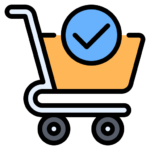If you’re in the forklift market for the first time, have returned to the market after a long absence, or just need to go back to the basics, understanding where to start in buying a new forklift can seem like a complex process. And it can be. That’s why getting organized in your pursuit of buying the best forklift is a great place to start, and Toyota can help to make sure you get the best ROI on your investment. Use this guide, which will show you what to expect, offer a few tips to help you succeed, and help you recognize a few pitfalls to avoid.
What to Expect Before you Buy a Forklift
Buying a forklift is a big investment and it can provide a large ROI for your business. But the wrong forklift can become just another cost center. The best forklift (which is always the right forklift for your unique operation) can help you save money, increase productivity, and decrease your overall downtime. Here are some things to expect as you go to buy a forklift.
- You’ll need to know your requirements. As you navigate the wide range of products available to in the material handling market, the first thing you’ll need to know is what you’re trying to accomplish. That means you’ll need to take time to audit your operation. You can use this list to help you get started. If you don’t know the answers, Imartpk can help you get the answers with a site survey.
-
- How high do you need to lift?
- Where will the forklift primarily be used – indoors or outdoors?
- How wide are the aisles and doors?
- How many hours will the forklift be in use per day?
- What kind of tires will you need?
- Are there any specific options or accessories you will need?
- Do you have properly trained operators?
- You’ll need to decide if you want a new vs. used forklift. As a general rule of thumb, if you think you’ll run a forklift more than four hours a day, consider a new forklift. Factoring in maintenance costs, it will serve you better in the long run.
- You’ll need to consider the requirements of your people and your operation. Do you have an operator with a bad back? Consider the brand with the best ergonomics. Safety is key to success, so make sure you select the brand with the best standard safety features (like Toyota’s System of Active Stability).
- You’ll need to assess brands and dealers, in addition to forklifts. The thing about capital investments? You’ll have a much better ROI when you have a dedicated partner who can help you with all your material handling needs throughout your ownership, rather than someone who is just going to sell you a forklift. You may find a lesser known brand and a cheaper up-front price, but how easy will it be to get replacement parts when your forklift breaks down? And, why are they lesser known and cheaper? Visit the dealership and ask about the skill level of the technicians. Check references. You’re choosing a dealer that will be your material handling partner for years. You’ll be glad you did your homework.
A Few Quick Tips for getting the Best Forklift
- Find a Trustworthy Brand
- Think about What you Really Need (a good partner will help you figure that out)
- Know what kind of power you need (think about best fuel type and tire options)
- Consider the forklift operator (you might not be using it; but their comfort will matter for their productivity)
- Know what you can afford and how to maximize ROI.
Five Common Mistakes When Searching for the Best Forklift
There’s a great deal of information about what you should do when in your search for the best forklift for your unique operations. But have you ever wondered why somebody didn’t warn you when you were about to make a misstep you can’t get back? Here are some common mistakes many first-time forklift buyers make.
- Buying on price alone: Don’t be tempted to buy the cheapest forklift that meets your minimum capacity requirements. There are many other important factors to consider before buying a forklift, and up front price is only one of them.
- Not trying before you buy: Once you’ve decided the make and model of the forklift you want, rent one to try it out in your actual work conditions. Make sure your operator has input, too. They will be the one driving it all day.
- Not buying from a dependable dealer: Buy your forklift from a reputable dealer who can perform emergency and general maintenance when you need it. Otherwise, you risk considerable downtime if your forklift breaks down.
- Not considering the total cost of ownership: Spending a little more up front can be an investment down the road, especially if your operations can become more efficient and productive over time.
- Not considering a maintenance plan: Getting on a maintenance plan helps catch problems early to reduce downtime and keeps your operators safe with regular inspections. Maintenance plans can also help increase the life of a forklift.





















